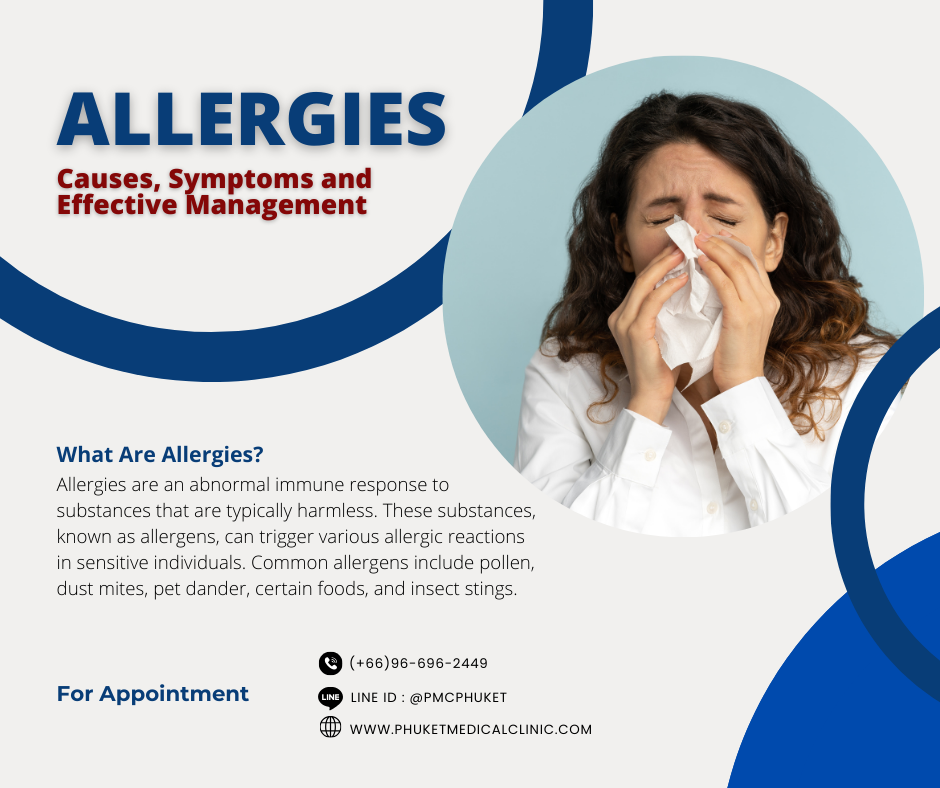Allergies are a common health concern that affects millions of people worldwide. They can range from mildly annoying to severe and life-threatening. In this article, we will delve into the world of allergies, exploring their causes, symptoms, and effective management strategies.
What Are Allergies?
Allergies are an abnormal immune response to substances that are typically harmless. These substances, known as allergens, can trigger various allergic reactions in sensitive individuals. Common allergens include pollen, dust mites, pet dander, certain foods, and insect stings.

Causes of Allergies
- Genetic Predisposition One of the leading causes of allergies is genetic predisposition. If your parents or siblings have allergies, you are more likely to develop them too. Understanding your family history can be a crucial step in identifying your risk.
- Environmental Factors Environmental factors play a significant role in allergy development. Exposure to allergens during early childhood can increase the risk of developing allergies. Additionally, living in areas with high pollen or pollution levels can exacerbate allergy symptoms.
Common Allergy Symptoms
Allergy symptoms can vary depending on the type of allergen and the individual’s sensitivity. Common symptoms include:
- Sneezing and Runny Nose: Allergic rhinitis often leads to sneezing, nasal congestion, and a runny or itchy nose.
- Itchy and Watery Eyes: Allergies can cause redness, itching, and excessive tearing of the eyes.
- Skin Reactions: Skin allergies can manifest as hives, eczema, or general itching.
- Respiratory Issues: In severe cases, allergies can lead to asthma symptoms, such as coughing and wheezing.
Effective Management Strategies
Managing allergies effectively can significantly improve one’s quality of life. Here are some strategies:
- Avoidance Identifying and avoiding allergens is the primary step in managing allergies. This may involve keeping windows closed during high pollen seasons, using air purifiers, or avoiding specific foods.
- Medications Over-the-counter or prescription medications can help alleviate allergy symptoms. Antihistamines, decongestants, and corticosteroids are common options, but consult a healthcare professional for guidance.
- Immunotherapy For individuals with severe allergies, allergen immunotherapy (allergy shots) may be recommended. This treatment can help desensitize the immune system to allergens over time.
When to Seek Medical Help
If you or a loved one experiences severe allergy symptoms, it’s crucial to seek medical assistance promptly. Anaphylaxis, a severe allergic reaction, can be life-threatening and requires immediate attention. Symptoms of anaphylaxis include difficulty breathing, swelling of the face or throat, and a drop in blood pressure.
Allergies are a common health issue that can significantly impact one’s daily life. Understanding the causes, symptoms, and effective management strategies is essential for individuals with allergies and those who care for them. By taking proactive steps to identify and manage allergens, individuals can lead healthier and more comfortable lives. Remember to consult with a healthcare professional for personalized guidance on allergy management.
Allergies – Diagnosis and Treatment in Phuket
Phuket Medical Clinic : Close, Expert Care. Dedicated Medical Professionals and Skilled Team providing Consultation and Treatment. Walk-in or Scheduled Appointments for Convenient and Efficient Services.
Book an appointment online : https://phuketmedicalclinic.youcanbook.me
Daily Open 🕙 10:00-18:00
Contact number ☎️ 096-696-2449
Line id : @pmcphuket or https://lin.ee/R1TKRDo
Map 📌https://goo.gl/maps/xu45eTQUTjgpukJa7
Website 🌐https://phuketmedicalclinic.com
Feel free to consult with a doctor or ask further questions anytime.
Inbox : m.me/100483916443107
#healthcareclinic #คลินิกภูเก็ต
Phuket #Clinic #ภูเก็ตเมดิคอลคลินิก
#Phuketmedicalclinic
